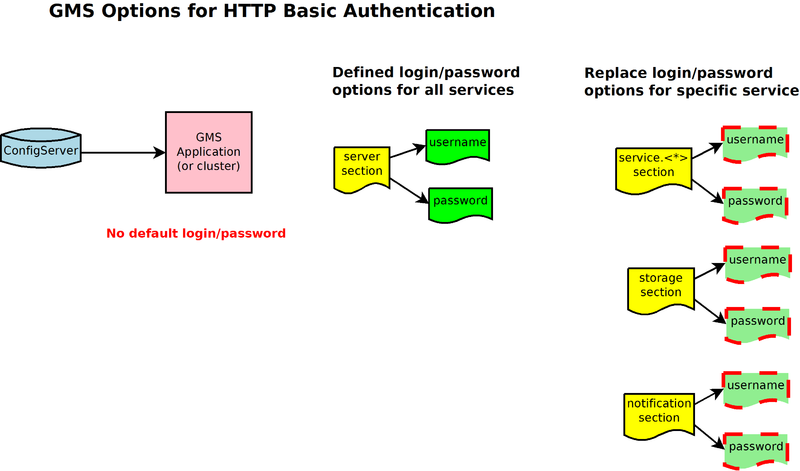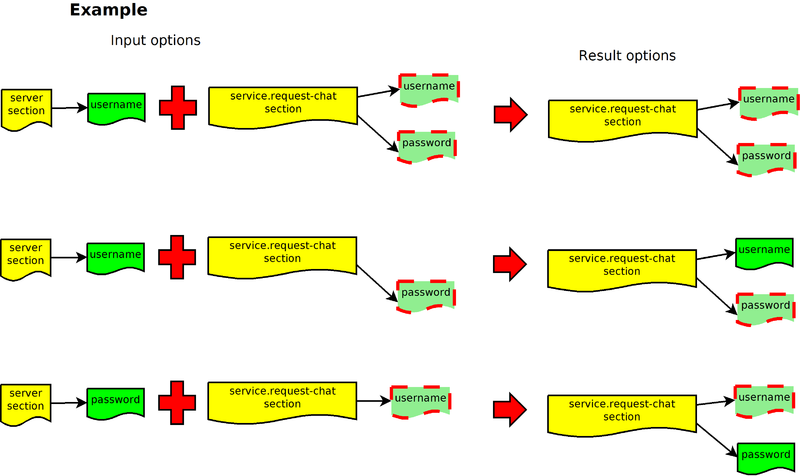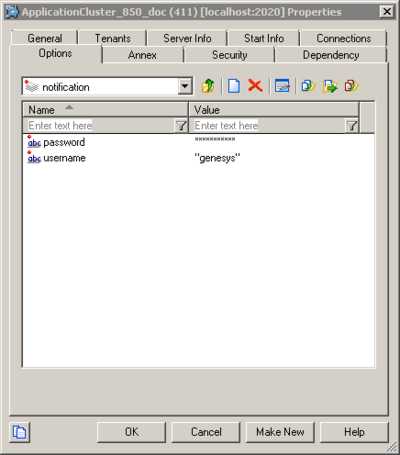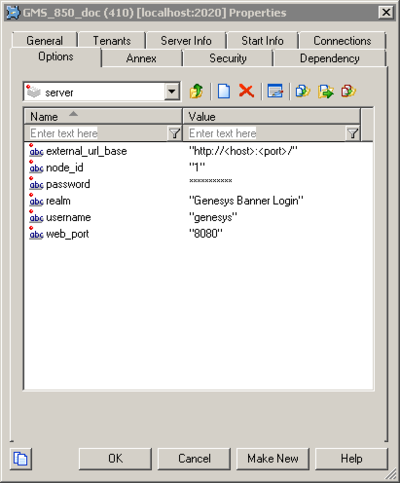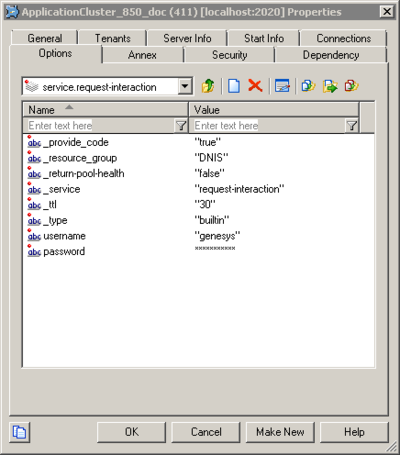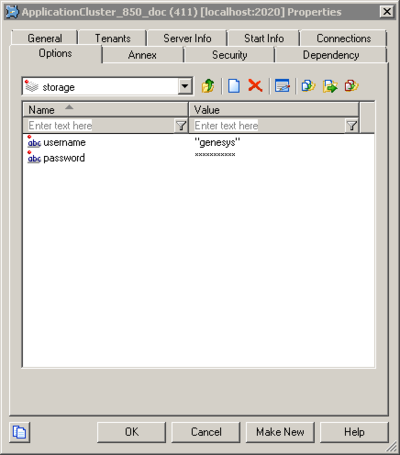Contents
Enabling Basic Authentication
Modified in 8.5.108
HTTP Basic Authentication is a method for an HTTP client to provide a user name and a user password for each HTTP request where a resource needs access control.
GMS supports Basic Authentication on the following services:
- Storage service
- Notification service
- Callback service
- and all services that have a section (with the prefix service.) in the GMS application.
Configuration
By default, the Basic Authentication feature is turned off. The following sections and options must be set in the GMS application in order to turn on this feature.
| Section | Option | Supersedes | Description |
|---|---|---|---|
| server | realm | Defines the authentication scheme. The default value is Genesys Application Configuration Needed. | |
| server | username | Defines a global username for all services. Note: Without the password option, no authentication is effective. | |
| server | password | Defines a global password for all services. With this option, Basic Authentication is turned on for all services. | |
| service.* | username | server/username | Defines a specific username for one service. Note: Without the password option in the same service section, the server section password is used. If there is no server section password, no authentication is applied. |
| service.* | password | server/password | Defines a specific password for one service. |
| callback | username | server/username | Defines a specific username for the callback service. This option is not taken into account for other callback API URLs which still use service.* configuration (if defined).
Note: Without the password option in the same service section, the server section password is used. If there is no server section password, no authentication is applied. |
| callback | password | server/password | Defines a specific password for the callback service. |
| storage | username | server/username | Defines a specific username for the storage service. Note: Without the password option in the same service section, the server section password is used. If there is no server section password, no authentication is applied. |
| storage | password | server/password | Defines a specific password for the storage service. |
| notification | username | server/username | Defines a specific username for the notification service. Note: Without password option in the same service section, the server section password is used. If there is no server section password, no authentication is applied. |
| notification | password | server/password | Defines a specific password for notification service. |
Precedence Example
Configuration Option Examples
Basic Authentication Username and Password for Notification API:
Basic Authentication Username and Password for GMS Node API:
Basic Authentication Username and Password for Service API:
Basic Authentication Username Password for Storage API:
Digital Channels API
Starting in 8.5.108, Basic Authentication is supported for the Digital Channels API. You can configure Basic Authentication for your GMS application using the options described above and these settings will apply to all of your services; or, you can turn Basic Authentication on and off on the Digital Channels channel or service level independently from GMS.
For compatibility reasons, Basic Authentication for Digital Channels API is turned off by default. To enable this feature, create the disable_authentication option in the appropriate media section (chat or email) and set this option to false.
disable_authentication=false
By default, disable_authentication=true and this disables Basic Authentication for Digital Channels API even if you configure Basic Authentication in your GMS configuration.
You can also define and override the username and password options either in server, media, or media service sections. Refer to Digital Channels API configuration for additional details. .
Client Side
When Basic Authentication is turned on from the GMS server-side, the client must manage the HTTP Authentication header to set the username and password in the Authorization header. Only HTTP Basic Authentication is supported. The header request for authentication should look like the following (credential is a string with a specific format [username:password], and base64 encoded):
Request > GET /genesys/1/storage/id HTTP/1.1 > Host: localhost:8080 > Accept: */* > Authorization: Basic ZGVmYXVsdDpwYXNzd29yZA==
Response < HTTP/1.1 200 OK < Date: Thu, 13 Feb 2014 14:44:14 GMT
If the authentication fails, the response looks like this:
Request > GET /genesys/1/storage/id HTTP/1.1 > Host: localhost:8080 > Accept: */* > Authorization: Basic ZGVmYBVsdDpwYXNzd29yZA==
Response < HTTP/1.1 401 Unauthorized < Date: Thu, 13 Feb 2014 14:47:55 GMT < WWW-Authenticate: Basic realm="Genesys Application Configuration Needed" < Content-Length: 0
Example:
Configuration Manager is configured for the service.request-interaction section using the following basic authentication parameters:
- username = genesys
- password = genesys
Request without credential:
POST /genesys/1/service/request-interaction HTTP/1.1 Host: localhost:8080 Accept: */* Content-Length: 40 Content-Type: application/x-www-form-urlencoded
Response with the authentication error:
HTTP/1.1 401 Unauthorized Date: Thu, 13 Mar 2014 07:55:38 GMT WWW-Authenticate: Basic realm="Genesys Application Configuration Needed"
The same request with credential:
POST /genesys/1/service/request-interaction HTTP/1.1 Authorization: Basic Z2VuZXN5czpnZW5lc3lz Host: localhost:8080 Accept: */* Content-Length: 40 Content-Type: application/x-www-form-urlencoded
Response of the request:
HTTP/1.1 200 OK
Date: Thu, 13 Mar 2014 07:55:55 GMT
Expires: Thu, 01 Jan 1970 00:00:00 GMT
Content-Type: application/json;charset=UTF-8
{"_access_code":"152606","_expiration_time":"29","_id":"413-ac85eb82-3e5e-414e-9ed2-08392320f234",
"_access_number":"6504664630"}
DFM Configuration
When using Basic Authentication, you must also update DFM in order to protect the username/password.
- In Configuration Manager, locate and open the Application object for your Orchestration Server (ORS).
- Select the Options tab.
- Add a new section dfm.<server_name>.
- Add the following options and values:
- username, value = genesys1
- password, value = password1
- maxage, value = 60 (optional)
- maxstale, value = 60 (optional)
- Repeat Steps 3 and 4 for each server.
- Save the ORS application object and restart ORS.
Stat Service API
Two access interfaces are available for the Stat Service API.
One interface is for external access with Basic Authentication.
Example:
curl --request POST \
--url http://demosrv-gme.genesyslab.com/genesys/1/statistic \
--header 'authorization: Basic ZGVmYXVsdDpwYXNzd29yZA==' \
--header 'content-type: application/x-www-form-urlencoded' \
--data objectId=KSippola \
--data objectType=Agent \
--data tenant=Environment \
--data metric=TotalLoginTimeAnd the other interface is for internal usage (that is, internal access without authentication, for instance, between an ORS strategy and GMS).
curl --request POST \
--url http://demosrv-gme.genesyslab.com/genesys/1/internal_statistic \
--header 'content-type: application/x-www-form-urlencoded' \
--data objectId=KSippola \
--data objectType=Agent \
--data tenant=Environment \
--data metric=TotalLoginTimeIn the external access interface for the Stat Service API, Basic Authentication is achieved using credentials from the Config Server. Configure a user in CME/GAX, in the Member Of tab add Administrator, and in the Annex tab specify the following key/value:
[gms]
roles=Administrator,Supervisor
For the other GMS services/APIs, authentication is set up in the GMS application options:
- For all API authentication setup, the option can be set in the server section using the following options:
- username and password
- username and password
- For individual selection of authentication setup per service, the username and password options can be set in the following sections:
- callback section for all callback services (Callback API)
- service.<callback name> section for a callback service (Callback API)
- storage section for the Storage API
- notification section for the Subscribe/Publish API (Notification API)

